Physical Address
304 North Cardinal St.
Dorchester Center, MA 02124
Physical Address
304 North Cardinal St.
Dorchester Center, MA 02124

Almudena Moreno Mnguez Jurídicas y de la Comunicación Facultad de Ciencias Sociales Universidad de Valladolid Spain
As a result of the changes that Spanish families are undergoing within the context of Europe, several institutions undertook research in the 1980s aimed at studying the changes in family values among young Spaniards. Taking these studies as a reference, the aim of this article is to analyze the factors determining the late emancipation of Spanish youth with regard to the family of origin. With this objective in mind we have taken such indicators as age or emancipation of young people, financial and personal independence from the family of origin, attitudes towards the family, and relationships amongst couples together with how well they get on with their parents. The initial hypothesis makes reference to the fact that in Spain, the position occupied by young people within the framework of social welfare benefits family socialization and contributes to the continuance of cultural guidelines linked to “familialism”, defined as solidarity within and dependence on the family, characteristic of Mediterranean countries.
The transition to adulthood is the process by which young generations pass from family dependence to autonomy. First of all, independence and autonomy can be reached in various ways: by leaving the parental family, by access to more or less steady employment, by starting to cohabit with a partner or by setting up a family of one’s own. Secondly, the time required to carry out the whole process is in and of itself important and it is depends on cultural and economic factors. These factors contribute to delay the emancipation of the youths, as is the Spanish case. Moreover, the transition to adulthood is affected not only by material considerations but also by psychological motives, as well as by elements of a normative, institutional or cultural nature subject to frequent variation in both time and in space (Sgritta, 2001).
Among the conditions that influence this process, two are particularly important: the family and the welfare system. By now, the theoretical idea of welfare regime has come to be a part of the conceptual armament of the social sciences. The idea behind these terms is that “contemporary advanced nations cluster not only in terms of how their social-welfare policies, but also in terms of how these influence employment and general social structure” (Esping-Andersen, 1990:2). Talking about the welfare system instead of simply the welfare state or social policies means expanding the analytical framework to a great extent. Thus, many elements take their rightful place in the analysis: cultural heritage, the relationship between public and private, the power structure, social stratification, the system of social obligations, the regulation of the labor market, the education system, religion, voluntary organizations, associations, etc. The combination of these elements results in a regular pattern of occurrence or action and, as many studies and research findings have demonstrated, makes it possible to give a concise description of the welfare systems found in different countries or clusters of countries (Esping Andersen 2000) or different “families of nations”(Castles, 1998).
If one excludes the contributions of experts from countries with strong familialistic tendencies (Balbo, 1976, Ferrera, 1998 1984; Donati, 1981; Paci, 1982; Sgritta, 1983, 1984, 1988; Saraceno, 1984, 1996), the family has not always received the attention it deserves from an economic and political point of view. Until a few years ago, it was mainly considered a residue of traditional societies predating the formation of the welfare state. The family was perceived as an out of date institution, less and less responsible for the production of welfare. Things are different today. Recently, G. Esping-Andersen recognised that the family is “an all-important actor”, “ perhaps the single most important social foundation of post-industrial economics” (Esping-Andersen, 2000: 67).
The family is therefore a key institution together with the market and the State when it comes to providing social welfare. Spanish families show a strong sense of intergenerational solidarity, as they offer shelter to young people faced with the uncertainties and risks of the socio-economic climate in an environment in which the welfare state has implemented a limited family care policy to cater for dependent groups (the young, the elderly and children). This applies to factors ranging from the formation of families to the fertility trend, from the division of domestic work, from the employment ratios of female, from the measures of income maintenance to the relations between the generations. For this reason, the transition to adulthood is, as we will see, an emblematic example of how welfare systems can become victims of their own organization (Sgritta, 2001: 2).
In an attempt to explain the situation of Spanish youth in Spain, one quite promising approach has been to examine the characteristics of the Mediterranean welfare regimes. The model of Sping Andersen identified three welfare regime by a range of different factors: the division of responsibilities between the different institutional spheres (family, market and state), the normative recognition of the different living arrangements and the objectives they pursue with regard to the support of children and dependent subjects in general. In the case of Spain the welfare state has placed the main responsibility for providing social welfare in the hands of the family, thus contributing to a consolidation of the cultural network, characterized by family dependence (familialism). To a certain degree this has influenced the late emancipation of Spanish youth.
Even though the category of “youngster” or “youth” does not refer to a homogeneous section of society, it does at least define, a lifestyle that differentiates them from other groups within society. Youngsters live part of their identity within the family and it should be pointed out that the family still exercises a significant stabilizing influence over Spanish youth. This is reflected in the late age at which emancipation from the family occurs, thus prolonging the length of time youngsters remain living at the parental home. This means that parents must keep their children over a longer period in a situation of dependence, thus maintaining the guidelines laid down for the concept of family solidarity. This key to family dependence has increased gradually since 1990, when only 25% of youngsters between 26 and 29 lived at home with their parents. The latest Youth Reports indicate that in 1996 46% of the population between 26 and 29 still lived at the home of origin (Martín, 1996: 49) and in the year 2000 this figure was 50% (Martín Serrano y Velarde Hermida: 2000). In other words, currently every other youngster is yet to leave his or her family of origin. This is a trend that is well known to sociologists and psychologists and is one which is due both to economic factors (difficulty finding a job, shortage of housing) as well as cultural factors (late emancipation linked to the prevailing sense of the family common in Spanish society and characteristic of southern European countries). As for the Southern European countries, the characteristics of these latter family nations are not all that different from those of the continental model. In the South of Europe, social policy is based “on the premise that there are two natural (or socially given) channels through which an individual’s needs are properly met: the private market and the family. Only when these break down should social welfare institutions come into play, an then only temporarily” (Titmuss, 1974: 30-31).
Longer in the South and shorter in the North, the residence of young people in the parental home inevitably reflects their living arrangements. An analysis conducted of Encuesta de Población Actica para el caso español is particularly illuminating in this regard. The following picture evidence that in Spain the average age of emancipation, so much of men as of women, has not left to enlarge since 1980, coming to be situated in the 28.6 years for the women and the 30.7 for the men. The differences between females and males concern a wide range of factors that either directly influence the transition to adulthood or are a consequence of it.
Chart 1.
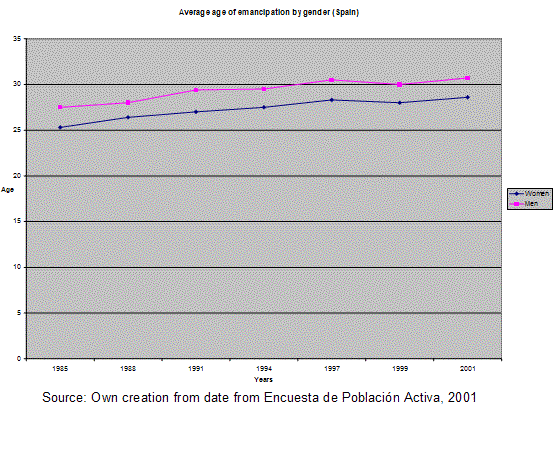
The European Panel shows that in the 16-30 age group, the percentage of young people who stay on with their parents amounts to 44.7%. This percentage is, however, the average between the decidedly high levels in the countries of the South (Italy: 65.1%; Spain: 59.1%, Portugal: 56.3%, Greece: 42.9%; and Ireland: 55,7%) and the much lower rates of the Nordic countries (Finland: 22.6%; Denmark: 24,7%; Sweden: 34%) with the countries of Central Europe to some extent in an intermediate position (UK: 34%; The Netherlands: 25%; France: 41% and Germany: 33%) (Sgritta, 2001).
The data relating to Spain show that in the year 2002 the proportion of young people between 25-30 still living with the family is between 40% y 60% (table 1). In light of these date, one might think that the Spanish young have serious problems in venturing down the road of the transition to adulthood. In recent years, changes have hit the new generations. The facts remains, however, that these changes have taken place with more or less equal intensity in all advanced societies. However, the phenomenon of the slowing down of the time for entry into adulthood is found to such pronounced degree only in Spain and in the other countries of southern.
Table 1. Young adults between 22 and 33 who live with the family or with other adults (Spain), 2001

According to some authors this delay in youngsters’ emancipation from the family is due to the characteristic “familialism” of certain conservative welfare regimes, where families aim to substitute public family welfare services (Esping Andersen, 2000). Studies conducted in Italy have shown that, as is the case with Spanish youngsters, young Italians are leaving their homes later and later (Zuanna, 1994; 2001). This occurs within the framework of a strategy of family solidarity and co-operation aimed at compensating for the shortcomings of state welfare that has based its welfare policies on caring for senior citizens and the unemployed, neglecting the economic and family situation of young people.
As can be seen in the following graph, there are in fact significant differences in the models for financial independence amongst young Europeans. Over the whole of the European Union, 45% of young European people between 15 and 24, say they receive most of their income from their parents and four out of ten from their regular job. Spain is below the European average, both in terms of income obtained from regular employment as well as from part time work. In the case of Mediterranean countries (Spain, Greece, Italy and Portugal) the percentage of young people depending on their families is significant (62%, 51%, 68% and 51% respectively). It might be interpreted that families in the Mediterranean area are more generous than the rest. However, the most likely explanation is that in these countries families play an important role in terms of social protection, a role that in other European countries is fulfilled by the state. The percentage of young people in Spain who can live on what the state provides them through benefits, subsidies or grants (1.5%), unemployment benefits or social security welfare benefits (2.1%) is very small as occurs among young Italians, Greeks or Portuguese. However, in countries such as Denmark, the Netherlands or Finland, the support provided by the state enables youngsters to be independent. This kind of support through unemployment benefit, social security welfare benefit or education grants provides the young student or unemployed person with greater independence, thus reducing the financial burden on families (Study 47.2 Eurobarometer, 1997).
Table 2. Models for financial independence for young Europeans (15-24 years) (%)
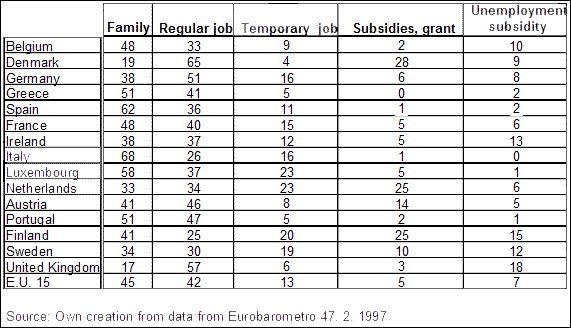
This situation of financial dependence is extremely common in Spain even amongst those young people who work, as 31% of young people in employment are not financially independent enough to meet certain expenses (Report on Youth, 2000). In fact at 25, only 32% of young people are financially independent and at 29, the figure is only 72%. These data allow us to state that the large majority of young Spanish people are financially dependent on their families, explaining to a certain extent why Spanish youngsters leave the family circle late and why, therefore, the phenomenon of “familialism” persists.
The studies on Spanish youth that have been conducted since the 1970s have shown the survival of a cultural model in which the family occupies a privileged position amongst young people. Factors such as late emancipation from the family or the copying of family traits inherited from parents (church weddings) are testimony to the deep rooted sense of the family that characterizes Spanish society.
In general, young people in Spain firmly believe in the family as the main body around which their private life is organized, although this does not mean that they do not discard, at least in theory, the possibility of opting for kinds of family that do not necessarily correspond to the traditional family model inherited from their parents.
For young people, the family is still the main factor influencing them socially. Here they learn the norms that will shape the many aspects of their social and personal identity. The changes in structure and inter-relationships that families have undergone have influenced the socializing role played by the family. This has been counterbalanced by the influence of other factors such as the media or peer groups, although this has not led to the disappearance of the socializing influence exerted by the family.
In the case of Spain, the individualizing and personalizing process of primary relationships has not undermined the stabilizing influence exerted by the family. In fact young people in Spain use the institution of the family to seek their personal and family independence without too much disruption. Over 90% of young Spaniards between 15 and 25 live with their parents, according to the latest Report on Youth. Among 15 to 17 year-olds, the figure is 98.6%, dropping to 86% for those between 20 and 24 (Garrido y Requena, 1996). This dependence on the family may be attributed to economic factors (difficulty finding a job, shortage of housing) and cultural factors (late emancipation linked to the dominating sense of the family prevailing in Spanish society). Young Spaniards link the family independence with the stable incorporation to the labour market. At this point the inflexibility of the labour market contributes to delay the emancipation of the youth and to reinforce the familialism culture. It is a slow search for independence within dependence on the family, clearly explaining why the family is the most highly valued institution amongst Spanish youth (INJUVE, 2000).
If we look in terms of sex, it can be seen from the following table that for 15 to 25 year-olds, the family is more important for women than it is for men. This indicates on one hand that the stereotype of the family woman still persists to a large degree in Spanish culture and on the other that the internalizing of sex role models still survives through the traditional family.
Table 3. Proportion of young people (ages 15- 24) who consider “very important”
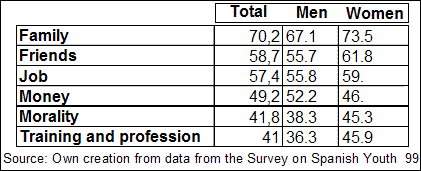
The vision of the family as a world of personal socialization and stability appears to be a constant in the cultural identity of Spanish youth. These attitudes on the part of young people are framed within a family culture that is based on a mutual exchange of affection and material goods between parents and sons that has led to late emancipation. Therefore, family permissiveness and flexibility of parental authority have enabled young people to obtain all the comforts derived from living at home with their parents for a longer time.
The importance attached to the family is greater as academic qualifications increase, above all amongst graduates. This, however, might be a reflection of in the age factor and of the social classes where individuals belong. Young people with upper studies mainly come from the high and middle class. Therefore, economic situation (social class) partially explains that the level of understanding between parents and sons from upper-class families is higher than those from the working class. This fact has been documented by authors such as Gonzalo Anleo (1999: 152).
Chart 2. % of young people between 15 and 24 years old who consider the family “very important” according to surveys
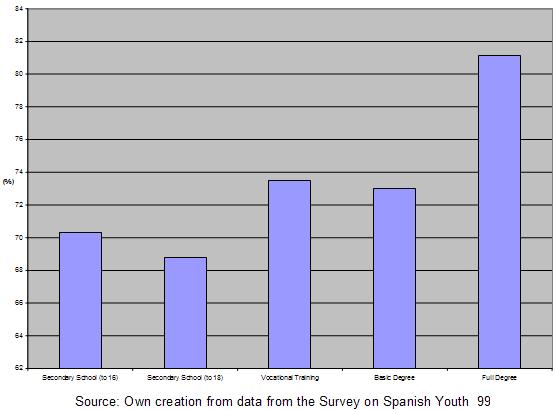
Family values such as solidarity and dependence are transmitted from parents to children. That explains why in the culture of the Spaniards the family occupies such a privileged place. This means that although the family may have lost part of its role in terms of providing a stabilizing and controlling influence, it has not lost its social function as youngsters still look to it as a reference when developing their personality and identity.
We have seen how family values have a great influence on the character of young people in Spain, yet how are these values reflected in the families of Spanish youth or in other words, what is the future for the Spanish family? The family oriented culture of Spanish society has attached great importance to the institution of marriage as the foundation stone of the family. To a certain extent young Spaniards play an active role in this cultural influence. In fact in 1999, 51% of youngsters between 18 and 24 stated that marriage was extremely important to them (Spanish Youth, 1999). It is precisely among young people that a reduction in support for the institution of marriage is becoming apparent.
These changing attitudes might provide an insight into future behavioral trends that are still latent today. Young graduates living in an urban environment are the most skeptical towards the institution of marriage, placing greater value on personal freedom and an escape from institutional control than youngsters with fewer qualifications (INJUVE, 2000).
Table 4. Proportion of people who consider marriage very important

One of the most significant elements is the change in young people’s attitudes towards unmarried couples living together, although this is not reflected in their actual behavior. In many respects this is a practice of enormous sociological interest as it may point the way towards future behavior. The data consulted seems to confirm that the attitudes and expectations of Spanish people have not changed with regard to marriage in the last decade. The conclusions may be drawn from the research performed by the Fundación Santa María, according to which church marriages have become more popular since 1984. However, civil marriages, since their peak in 1984, are the preferred choice of 14 out of every 100 people surveyed, whereas the percentage of young people favoring unmarried couples living together has increased since 1984. This reflects a change in how relationships among couples are viewed in Spanish society, once more ahead of the political situation of the time (see table 5).
Table 5. Young people’s attitudes with regard to marriage (%)
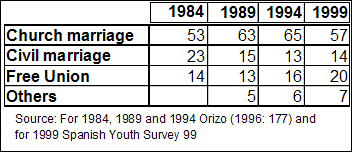
In just one decade, the institution of marriage has lost part of its importance in contrast to cohabitation, although not to the same degree as in other European countries. It seems reasonable to think that in the future there will be a greater tendency towards cohabitation among young Spanish people. A church wedding still maintains much of its cultural aura since it is a rite with deep-rooted cultural connotations that helps to preserve the importance of the family and its rituals (Voye, 1992). Academic qualifications explain how church marriages are more important for those with fewer qualifications. 66.4% of young people with few qualifications opt for a church marriage, opposed to only 50.4% of those who are more highly qualified. This is even more evident in the case of women, since qualifications favour financial independence, and therefore marriage loses part of the materialistic significance it formerly had for women. Paradoxicaly, young people with upper studies are the collective that gives more importance to the family. The explanation, as we saw in the previous section, can be found in the effects of the age and the social class.
Table 6. Type of couple relationship chosen by young people (%)
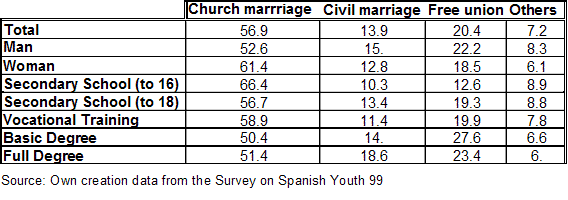
The attitudes of young Spanish people reflected in these data may be explained as a result of the process of modernization and individualization that on the one hand increases the desire for freedom from institutionalization – shown in the importance attached to marriage – and, on the other, increases family dependence as a buffer to the risks and uncertainties generated by post-modernization. This would partly account for the late emancipation of young Spanish people and the favored option of a church wedding which, in some way, contradicts the desires expressed with regard to marriage and cohabitation.
We should not forget that new factors such as divorce are becoming part of the family scene and are conditioning the family expectations of these young people. It means that in the future the generalization of the divorce in the Spanish society can destabilize the family culture. It is to be hoped that, as with their European counterparts, these young people who are experiencing the breakdown of families wish their children to have what they have been denied: a closely knit and stable family. The arrival of new types of family units may in the future contribute to bringing the family emancipation trends of young Spaniards into line with those of their European counterparts.
The economic benefits of the mediterranean Welfare States are mainly focused on the elder collective and on the male breadwinners (Lewis, 2001). The collective of the young people in countries like Spain are forgotten by the Welfare State.
A second common aspect is the marked familialism that characterizes the way the function in the field of both intervention and financing (Sgritta, 2001: 5). “The low degree of stateness of the Latin welfare system is one characteristic which isolates this family of nations from other present in Europe (Ferrera, 1995: 9).
It is noteworthy that in the countries of Southern Europe the main institution that mark the transition to adulthood and economic dependence is work. Youth unemployment (under the age of 25) is a problem in the great majority of European countries. In the countries of the South, however, it reaches abnormal levels -in some parts of Southern Greece, Italy and Spain even higher than 50%. It even hits young wit a high level of education (Sgritta, 2001: 7). The extremely high unemployment rate of the youth population -on average, over twice the average national rate- is probably due to the principal cause of late emancipation. In the following table is observed that the southern countries of Europe (Spain, Italy and Greece) have the highest ratios of young unemployed. This unemployment affects mainly women.
Table 7. Unemployment rates (youths less than 25 years) by gender, 2002
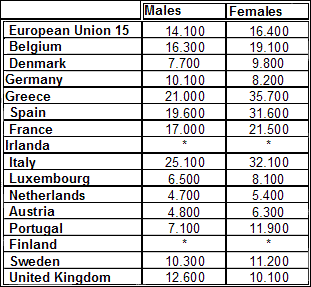
The number of women between the ages of 20 to 25 who are in the labor market is very low, if we compare to the men. This fact has contributed to delay the emancipation of the women as well as the formation of the family. This has its effect on socio-demographic behavior (Ferrera, 1998: 58). In the South, the number of women between 25 and29 who still live as singles without children is more than double that of those in the North: 49.2% vs. 23.4% (Sgritta, 2001: 8). In fact, with rare exceptions, this yields the following results: the proportion of young women in Spain between 20 and 29 who live with a partner, with or without children, is very low. This is due mainly to the difficulties faced by Spanish women in obtaining the maximum benefit from the higher educational standards which they are achieving and finding their way into the job market and into positions which reflect their training and qualifications.
Table 8. Employment people (ages 16-24) by gender and age (Spain)
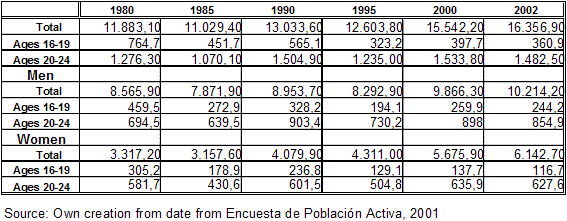
This is a case where the situation of youth employment is organically set in a system of inter-institutional relationship, a system in which labor market legislation, the trade unions and employers, have favored adult workers with families and have shown hardly any sensitivity for the condition of young people. With good reason, the Italian and Spanish model of unemployment has been described as having patriarchal roots (Flaquer, 2000; Sgritta, 2001). Coherently with the historically corporatist nature of the Spanish welfare system, the right to social protection is linked to one’s employment status. Moreover, since “there is no provision for income support for those who… still represent the majority of the unemployment, that is young men (and young women) looking for the first job…the entire burden of the cost of maintaining the unemployment…has been thrown on the families” (Plugiese, 1995: 470). There is agreement among those who have studied the phenomenon that is has been this familstic regime which has made it possible for Spain and Italy to contain the otherwise explosive tensions of very high youth employment.
The intergenerational solidarity makes it possible for most families to face the economic difficulties resulting from the long time that young people have to wait before entering the labor market. However, the protective action carried out by the family also risks producing socially undesirable effects. Even admitting that the families are able to cushion the negative effects of their younger member’s unemployment in the short to medium term, they cannot substitute for State intervention. In the long run, the overall implications for young people’s well-being can only be adverse, both with regard to the labor market (dependence on the family) and the spread of poverty. Just as it has indicated Sgritta (1993), in some regions of South, a real phenomenon of family poverty takes shape that particularly hits children and young people who end up being poor because they are forced to share in solidum the family’s financial situation. In the following table, it is observed that young people are the collective that has a bigger risk to experience poverty situations.
Table 9. Proportion of persons under the threshold of the poverty by age (Spain)
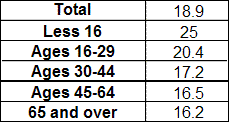
Note: “Threshold of poverty”: is the 60% of the medium one of the incomes of 1998 by unit of consumption (scale OCDE modified), taking the distribution of persons. The incomes by unit of consumption are obtained dividing the total incomes of the home among the consumption units number.
Adding to the financial difficulties encountered by young Spaniards when seeking independence are the high cost of living accommodation. Since 1990 (Trilla, 2002) house prices in Spain have risen 40%. If we bear in mind that the tendency in Spain for couples living together is to is to purchase rather then rent, it can be seen that it is the young who have suffered the consequences of this price increase most, as they are often forced to take out cripplingly long mortgages in order to buy accommodation. As can be seen from the following chart, youngsters between the ages of 16 and 29 are the age group where the lowest number of house owners is to be found.
This work has shown that factors such as state welfare benefits and family socialization contribute to delaying the age at which emancipation and personal independence are achieved. This perpetuates what is called “familialism” or “familyism” characterized by dependence and family solidarity, common in Mediterranean countries. We thus have a family that emulates itself through the intergenerational handing down of norms and values, perpetuating family solidarity and dependence as an idiosyncratic feature of Spanish families. In other words, the slowing down of young Spanish transition to adult life is an example of the “postponement syndrome”. The impression that one gets from the data we have examined is that a mechanism of “complicity” has been established between parents and children. It is difficult to establish what counts most in the mix of factors taking part in the process: culture, tradition, family solidarity, the absence of a policy of family support, the economic situation, and the dramatic scarcity of jobs or the inadequacy of employment instruments. The question is destined to remain. Each of these elements is certainly capable of influencing the course of events; each of these factors contributes to make up the final picture of the mosaic of young Spanish.
ALBERDI, I. ESCARIO, P. y MATAS. N. (2000): Las mujeres jóvenes en España, Barcelona, La Caixa.
ALVÁREZ , R. AZOFRA M J. y CUESTA, M (1999): Economía y Juventud, Madrid, Ministerio de Trabajo y Asuntos Sociales, Instituto de la Juventud
BALBO, L. (1976). Stato di famiglia. Bisogni, privato, collettivo, Milano, Etas.
CASTLES, F. AND FERRERA, M. (1996): “Home Ownership and the Welfare State: Is Southern Europe Different?, South European Society and Politics, 1 (2), pp 163-184.
CASTLES, F. (1998): Comparative Public Policy, Cheltenham, Edward Elgar
CRUZ CANTERO, P. y SANTIAGO GORDILLO (1999): Juventud y entorno familiar, Madrid, INJUVE Ministerio de Trabajo y Asuntos Sociales.
DE MIGUEL, A. (1994): Informe sobre la sociedad española, Madrid, Universidad Complutense.
DE MIGUEL, A. (2000): Dos generaciones de jóvenes 1960-1998. Madrid, INJUVE Ministerio de Trabajo y Asuntos Sociales.
DONATI, P. (1981). Famiglia e politiche sociali, Milano, Angeli.
ELZO, J. y OTROS (1994): Jóvenes españoles 94, Madrid, Fundación Santa Maria, S.M.
ELZO, J. y OTROS (1999): Jóvenes españoles, 99, Madrid, Fundación Santa Maria.
ESPING ANDERSEN, (2000): Fundamentos sociales de las economías postindustriales, Barcelona, Ariel.
EUROPEAN COMMISSION (1997): Les jeunes de lUnion Européenne ou les ages de transition, Eurostat.
EUROPEAN COMMISSION (1997): Youth in the European Union, Eurostat.
FERRERA, M. (1995): Lequatro Europe tra universalismo e selettivitá, Università Bocconi, Milano, Quaderni di Ricerca, 1
FERRERA M. (1998). Le trappole del welfare, Bologna, Il Mulino.
FLAQUER, L. (1997): “La emancipación familiar de los jóvenes”, Revista de Estudios de Juventud, n 39, mayo 1997, pp.37-46
FLAQUER, L. (2000): Las políticas familiares en una perspectiva comparada, Fundación La Caixa, Barcelona.
FROUFE, S. (1995): “El protagonismo de la familia ante la transmisión de los valores sociales”, en Documentación Social, n 98, pp. 61-72
GARRIDO, L. y REQUENA, M (1996): La emancipación de los jóvenes en España, Madrid, INJUVE Ministerio de Trabajo y Asuntos Sociales.
GAUTHIER, A. H., FURSTENBERG. F. (1999). “How do young people use their time? Across-national comparison of time budget surveys”, paper prepared for the International Conference on Youth Transition, Philadelphia, April 9–10, 1999.
GIL CALVO. E. (2001): Nacidos para cambiar, Taurus, Madrid.
GONZÁLEZ ANLEO, J. (1999): “Famlia y escuela en la socialización de los jóvenes españoles”, en Los jóvenes españoles, 1999, Fundación Santa María, Madrid, pp 121-182.
GREEN D. (1998): Taking steps: young people and social protection in the European Union, A report for the European Youth Forum.
IGLESIAS, J. (1997): “Los valores familiares de los jóvenes” en Revista de Estudios de Juventud, n 39, mayo 1997, pp.37-46
INSTITUTO DE LA JUVENTUD (2001): Vivienda y juventud en el año 2000.
JURADO, T. (2001): Youth in Transition. Housing, Employment and Social Policies in France and Spain, Ashgate, Aldershot.
LEWIS, L., (2001): “The Decline of the Male Breadwinner Model: The Implications for Work an Care”, Social Politics” 8. (2):152-70,
MARTÍN CRIADO, E. y OTROS (2000): Familias de clase obrera y escuela, Donostia, Iralka.
MARTIN, M. (1991): Los valores actuales de la juventud en España, INJUVE, Madrid
MARTIN, M. (1994): Historia de los cambios de la mentalidad de los jóvenes entre 1960-1990, Madrid, INJUVE.
MARTIN, M. y VELARDE, O. (1997): La juventud en cifras, Madrid, INJUVE.
MARTIN, M. y VELARDE, O. (2000): La juventud en cifras, Madrid, INJUVE.
MORENO MINGUEZ A. (2002): “El mito de la ruptura intergeneracional en los jóvenes españoles”, Revista de Estudios de la Juventud, n 58, pp.33-44, Ministerio de Trabajo y Asuntos Sociales, Instituto de la Juventud.
MORAN, M L. y BENEDICTO, J. (2000): Jóvenes y ciudadanos: Propuesta para el análisis de las culturas ciudadanas de la Juventud. Ministerio de Trabajo y Asuntos Sociales, Instituto de la Juventud.
MORAL, F. (2002): El cambio en las actitudes y valores de los jóvenes. Instituto de la Juventud. Ministerio de Trabajo y Asuntos Sociales
ORIZO, A. (1984): Encuesta europea de valores en España, entre la apatía y el cambio social.
ORIZO, A. (1996): Sistemas de valores en la España de los 90, Madrid, CIS, Siglo XXI.
PUGLIESE, E. (1995). “Gli squilibri del mercato del lavoro”, in: Storia dell’ Italia
Repubblicana. La trasformazione dell’Italia: sviluppo e squilibri, Torino, Einaudi,pp. 419–475.
SARACENO, C. (1984). “Shifts in public and private boundaries: The case of day care in Italy”, in: Feminist Studies.
SCABINI, E., Cigoli, V. (1997). “Young adult families: an evolutionary slowdown or a breakdown in the generational transition?”, in: Journal of Family Issues, 18, 6, pp.608–626.
SGRITTA, G. B. (1994). “The generational division of welfare: equity and conflict”, in: Qvortrup, J. et al. (eds.), Childhood matters. Social theory, practice and politics,Aldershot, Avebury, pp. 335–362.
SGRITTA, G.B. (2001): “Family and Welfare Systems in the transition to the Adulthood”, Paper presented at the Seminar “Family Forms and the Young Generation in Europe”, organised by the European Observatory on the Social Situation, Demography and Family at the Austrian Institute for Family Studies, Milan (Italy), 20–22 September 2001
SPING ANDERSEN, G. (1990): The Three Worlds of Welfare Capitalism, Polity Press, Basil Blackwell.
SPING ANDERSEN, G. (2000): Fundamentos sociales de las economías postindustriales, Ariel, Barcelona
TRILLA, C (2001): La política de vivienda en una perspectiva europea comparada, Fundación la Caixa, Barcelona
VOYE, L. (1992): “Le religieux”, en Voyé, L., Belges, hereux et satisfaits. Les valeurs des Belges dans les années, 90, Bruselas, De boeck Université.
ZARRAGA, J. (1988): Informe Juventud en España, Madrid, Ministerio de Asuntos Sociales.
© Electronic Journal of Sociology